What is Vitamin C
Vitamin C (or ascorbic acid) is the vitamin par excellence, as it participates in numerous biological processes and physiological "protective" mechanisms for the organism. In the human body, this molecule strengthens the immune defenses, prevents cardiovascular diseases, supports wound healing, facilitates the absorption of iron, but not only. The function for which it is best known is the antioxidant: vitamin C protects cells from free radicals - highly reactive and energy-laden metabolic residues, which are formed during metabolic processes - assisting their neutralization. This effect results in the prevention of inflammation, aging and the development of tumors. For this reason, it is important to take it through foods that are rich in it, so that the body can take advantage of it.
Vitamin C for the Skin: characteristics and properties
In the cosmetic field, vitamin C is best known for its powerful antioxidant activity. This is expressed through the scavenger effect, that is, it literally acts as a "scavenger" of reactive oxygen species and in the regeneration of α-tocopherol (vitamin E), starting from its oxidized form. On the one hand, therefore, vitamin C is able to provide direct anti-radical protection (it reduces chemical reactivity and, consequently, the toxicity of free radicals); on the other hand, it is able to amplify the benefits ensured by other antioxidant substances (including vitamin E and glutathione) and participates in the metabolic processes that lead to their physiological regeneration, making them useful again in their important activity against free radicals.
From the chemical point of view, the free radicals these compounds are very unstable, they remain alive only a few thousandths of a second, during which they attack any molecule of the surrounding environment, in order to acquire stability. As a rule, free radicals do not create problems, as they are neutralized by antioxidants naturally present in the tissues, which block them and prevent their potential damage. When they find the right conditions, free radicals are able to initiate reactions that favor the production of toxic substances and damage some cellular components (including membrane phospholipids, DNA and proteins).
Vitamin C in Cosmetics: stability and formulas
Vitamin C is used to formulate creams, serums, face oils, masks or gels with protective, anti-aging and antioxidant action. Together with the B vitamins, vitamin C is a water-soluble substance, i.e. soluble in an aqueous environment. When formulated in oil-based cosmetics, it can be found in the form of water-in-oil micro-emulsions.
Vitamin C is poorly stable, that is, it tends to oxidize rapidly. The degradation in cosmetics that contain it can be observed simply by noting the color change: from yellow (non-oxidized form) to brown brown (oxidized form). To overcome this problem, possible solutions consist in replacing vitamin C in the form of ascorbic acid with more stable forms (such as ascorbable magnesium phosphate), reducing the pH of the formulation and replacing water as a solvent with other capable substances. to increase its stability. Another method used to fully and effectively exploit the properties of vitamin C is to insert it in pure form inside pressure tanks or capsules.
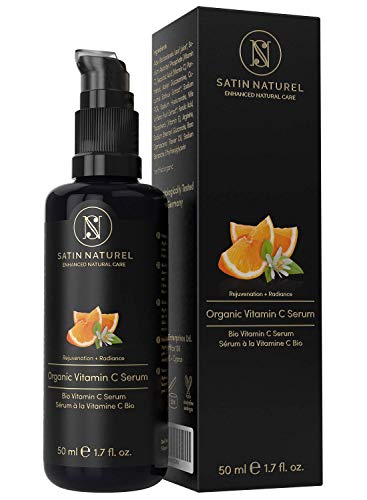 WINNER 2020 * ORGANIC Vitamin C Serum with Pure Hyaluronic Acid 100% Vegan 50ml - Double Complex Vitamin C 30% IMPROVED with Aloe Vera - Use it as Face Cream - Cosmetics Made in Germany by
WINNER 2020 * ORGANIC Vitamin C Serum with Pure Hyaluronic Acid 100% Vegan 50ml - Double Complex Vitamin C 30% IMPROVED with Aloe Vera - Use it as Face Cream - Cosmetics Made in Germany by
 € 14,98 Check out the offer
€ 14,98 Check out the offer
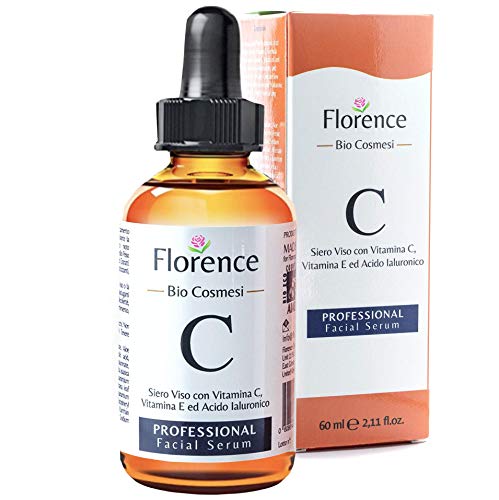 WINNER 2020 BIO ● Face Serum with 100% Pure and ORGANIC HYALURONIC ACID + Vitamin C + E ● HUGE 60ml ● With Vegan Anti-Aging, Anti-Wrinkle and Anti-Spot Ingredients ● Also for Dermaroller ● Cosmetics
WINNER 2020 BIO ● Face Serum with 100% Pure and ORGANIC HYALURONIC ACID + Vitamin C + E ● HUGE 60ml ● With Vegan Anti-Aging, Anti-Wrinkle and Anti-Spot Ingredients ● Also for Dermaroller ● Cosmetics  € 15,99 Check out the offer
€ 15,99 Check out the offer
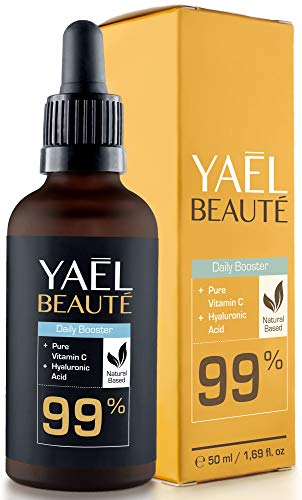 WINNER OF THE 2020 TEST *: Serum with Vitamin C and pure hyaluronic acid ● also for dermaroller ● illuminating and anti-wrinkle ● 99% natural ● vegan ● for men and women ● 50ml from
WINNER OF THE 2020 TEST *: Serum with Vitamin C and pure hyaluronic acid ● also for dermaroller ● illuminating and anti-wrinkle ● 99% natural ● vegan ● for men and women ● 50ml from
 € 16,99 Check out the offer
€ 16,99 Check out the offer
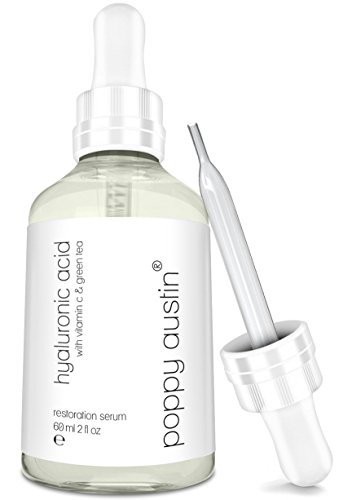 Hyaluronic Acid Serum for the Skin - HUGE 60 ml - Vegan, Cruelty Free, Organic - with Vitamin C, Green Tea, Jojoba Oil & Best 100% Pure Hyaluronic Acid from
Hyaluronic Acid Serum for the Skin - HUGE 60 ml - Vegan, Cruelty Free, Organic - with Vitamin C, Green Tea, Jojoba Oil & Best 100% Pure Hyaluronic Acid from
 € 20,49 Check out the offer
€ 20,49 Check out the offer
Dermatological actions of Vitamin C
At the skin level, free radicals prepare the ground for the onset of oxidative stress, one of the main enemies of the skin's youth: their effects can affect the deeper dermal layer, before damage can be observed on the surface.
After 20-25 years of age, the skin's ability to neutralize free radicals begins to reduce. These reactive compounds contribute to cellular aging and build up in tissues, causing a range of damage, such as wrinkles. Vitamin C contained in anti-aging creams and serums prevents oxidative stress by capturing free radicals and transforming them into species
less responsive. The topical use of vitamin C helps to counteract premature aging, especially when it is photo-induced, that is, caused by exposure to the sun and the harmful effects of ultraviolet radiation.
By limiting cell damage, vitamin C is able, in fact, to control the inflammatory response associated with exposure to UV rays. In cosmetology, vitamin C is also used for its action on connective tissue and on the integrity of blood vessels, as it stimulates the activity of fibroblasts and intervenes in the synthesis of collagen (fundamental substance of vascular endothelium). Based on these actions, vitamin C can be recommended as an adjuvant in topical treatments:
- Restorative of skin tone and elasticity;
- Brighteners (on the surface, vitamin C brightens the complexion and minimizes blemishes
hyperpigmented).
In routine skincare, topical vitamin C therefore represents one of the best allies to repair, protect and improve the appearance of the skin.
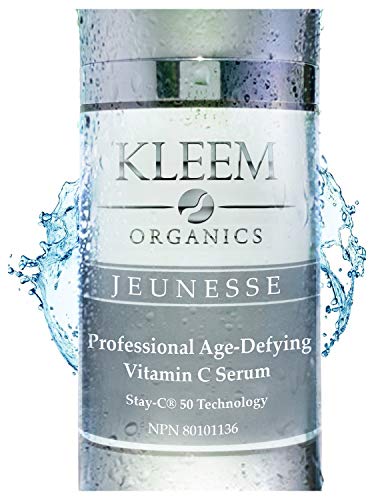 The Best ANTI-WRINKLE FACE SERUM with Pure Hyaluronic Acid and Vitamin C for Men and Women that Guarantees a Visible Anti-Aging Effect by Reducing Wrinkles, Face Blemishes and Dark Circles in just 6 Weeks. from
The Best ANTI-WRINKLE FACE SERUM with Pure Hyaluronic Acid and Vitamin C for Men and Women that Guarantees a Visible Anti-Aging Effect by Reducing Wrinkles, Face Blemishes and Dark Circles in just 6 Weeks. from
 € 16,97 Check out the offer
€ 16,97 Check out the offer
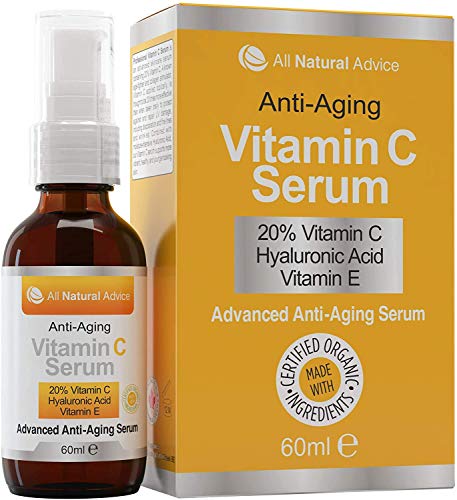 20% Vitamin C Serum • Fully Organic • Huge 60ml • Vitamin E • Hyaluronic Acid 11% • Moisturizer • Excellent for sensitive skin • Anti-aging anti-wrinkle and anti-blemishes • Can be used by
20% Vitamin C Serum • Fully Organic • Huge 60ml • Vitamin E • Hyaluronic Acid 11% • Moisturizer • Excellent for sensitive skin • Anti-aging anti-wrinkle and anti-blemishes • Can be used by
 € 19,88 Check out the offer
€ 19,88 Check out the offer
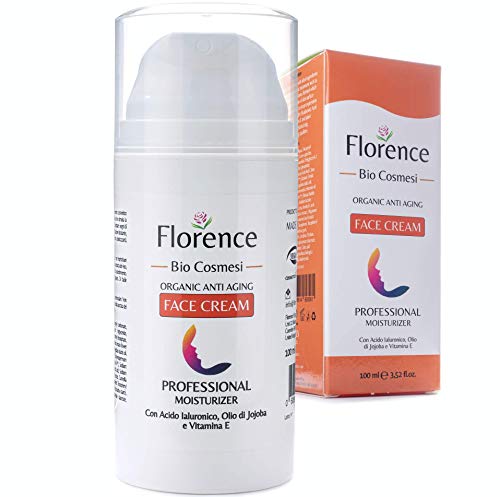 WINNER 2020 * BIO Pure Hyaluronic Acid Face Cream 100 ml ORGANIC + ANTI-WRINKLE Ingredients ● Moisturizing Night Cream for Décolleté and Eye Contour with Vit C + E + Aloe - VEGAN and Illuminating ● Made in Italy by
WINNER 2020 * BIO Pure Hyaluronic Acid Face Cream 100 ml ORGANIC + ANTI-WRINKLE Ingredients ● Moisturizing Night Cream for Décolleté and Eye Contour with Vit C + E + Aloe - VEGAN and Illuminating ● Made in Italy by
 € 13,99 € 22,99 -39% Check offer
€ 13,99 € 22,99 -39% Check offer
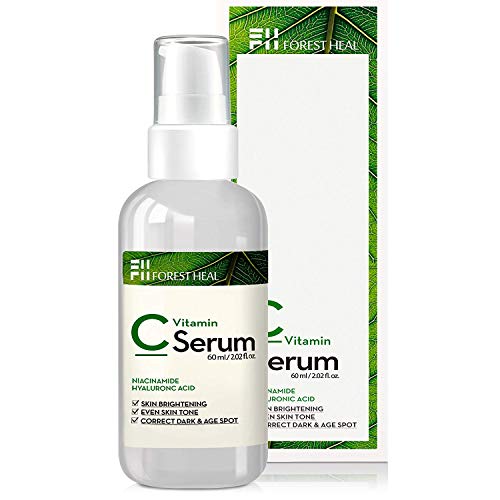 [Forest Heal] Retinol Anti Wrinkle Cream For Face And Dry Skin, Vitamin C Face Moisturizer, Anti Wrinkle Moisturizer For Day Or Night 24 Hour Lifting, Lightening (100 Ml / 3.38 Fl.Oz.)
[Forest Heal] Retinol Anti Wrinkle Cream For Face And Dry Skin, Vitamin C Face Moisturizer, Anti Wrinkle Moisturizer For Day Or Night 24 Hour Lifting, Lightening (100 Ml / 3.38 Fl.Oz.)
 € 14,99 € 16,99 -12% Check offer
€ 14,99 € 16,99 -12% Check offer
Sponsored Content: healthiergang.com features products and services that can be purchased online on Amazon and / or other e-commerce sites. Whenever a purchase is made through one of the links on the page, healthiergang.com could receive a commission from Amazon or from the other e-commerce companies mentioned. We inform you that the prices and availability of the products are not updated in real time and may change over time, so we invite you to check availability and price on Amazon and / or on other e-commerce mentioned.


























